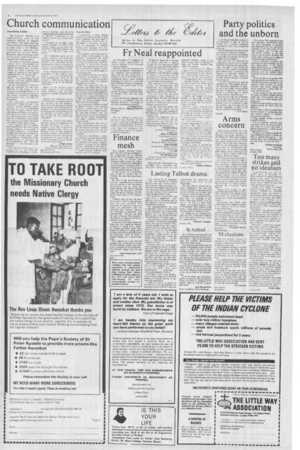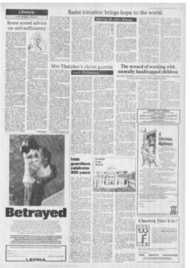Page 4, 9th December 1977
Page 4

Report an error
Noticed an error on this page?If you've noticed an error in this article please click here to report it.
Tags
Share
Related articles
Strong Community Spirit Among Catholics In The North-east
Bishops To Discuss English And Welsh 'missionary Areas'
Trust Pays ';t1 Million' To Protect Catholic Newspaper...
In Appreciation Of Cardiff's Late Archbishop John Murphy
Loyal Defiance Based On Foresight
Church communication
From Bishop Lindsay The Catholic Herald is a long-standing critic of the Church's policies in England and Wales. The paper has long been pressing for the opening of at least some of the Bishops' Conference agenda and proceedings to the Press. However, these legitimate aims do not justify some of the items you publish on December 2.
You claim in your leader that the bishops have reprimanded two commissions because the Catholic Herald published their proposals before our recent meeting. You suggest, as reasons for this alleged reprimand, that "the bishops feel . threatened." that "they may he afraid .. they will be asked to give reasons" and 'they might be asked to enter a public debate . .
In fact, the Bishops' Conference did not reprimand the two commissions. In the course of their usual private briefing, Bishop C.--y reminded commission secretaries of the present procedures regarding publication and confidential documents.
You call your unauthorised publication "doing one's job." You overlook several possible consequences: that the two commissions may now be more hesitant about circulating confidential documents; that one of your staff who belongs to at least one of those commissions may be considerably embarrassed; that you took an unfair advantage over other Catholic publications.
Your suggestion that we bishops feel threatened by the need to give reasons publicly or privately is needlessly offensive. I would have thought that the public debates we have begun on many issues — like "Groundplan," membership of the British Council of Churches. the Ten Propositions. and "Time for Building" — show that this is not the case.
The Herald dismisses our publication of the Bishops' Conference proceedings as "a per
functory briefing," and adds that "communications downwards (from the Bishops' Conference) to the Catholic community is almost non• existent."
I attended the so-called "perfunctory briefing"; the Editor of the Catholic Herald was not there. Our President, Archbishop Dv;ryer, was there with Bishop Casey and myself.
The Archbishop gave an excellent summary of conference decisions, and essential texts were handed to the journalists present. Question-time lasted as long as required. A communique with further material was available the next day.
As for "almost non-existent communication to the Catholic community," you have overlooked the daily professional work of the Catholic Information Services which was set up by the Bishops' Conference, Much of the domestic news which appears in our Catholic papers week by week has been supplied by Catholic Information Services.
Finally, your publication of the critical personal comments made by the chairman and the secretaryelect of the Commission for Racial Justice gives a very unfortunate impression. It will encourage people to disregard the bishops' statement on racialism; yet the principles of racial Justice are very clearly laid down there.
Moreover, Catholic Information Services, at my own suggestion, are already planning to issue in pamphlet form the commission's useful documentation about the National Front so that interested Catholics, at least, will be better informed about the front, its aims and its supporters. In other words, we seem to be doing what you and the commission really want.
t Hugh Lindsay Bishops' Representative, Catholic Information Services. Bishop's House,
Newcastle upon Tyne. From the Editor I would like to thank Bishop Lindsay for taking the time to give such a detailed and open reply to the editorial published on December 2. However, his letter gives an impression of Catholic Herald news reportage and comment which is not borne out by the facts.
With regard to the publication of some items on the agenda of the Bishops' Conference the week before the conference, the assumption that the information came from a member of staff of the Catholic Herald who happens to be on one of the commissions is without foundation and is a slur on the integrity of that staff member.
The Catholic Herald received no confidential documents or broke any confidences. Not all commission members share the bishops' anxieties over secrecy.
While we appreciate the cooperation and hard work of the Catholic Information Services, they are frustrated by the tight guidelines which enable them to publish only that which has episcopal blessing. It is these very guidelines, and the attitude of secrecy behind them, which need to be changed.
In the particular instance quoted by Bishop Lindsay, I feel that the Catholic community and the general public have a right to know the detailed reasons why the bishops did not act on the advice of their Racial Justice Commission and make a statement about the National Front.
They should know what sort of debate on the issue took place during the bishops' meeting, whether the matter was put to the vote and by what majority the final decision was made.
I am sorry that Bishop Lindsay took offence at some of the points made in the editorial. Offence was not intended, but merely a request for more openness by the bishops and their conference. Until that request is granted this paper will seek to report national Catholic news whether official or unofficial.
blog comments powered by Disqus











